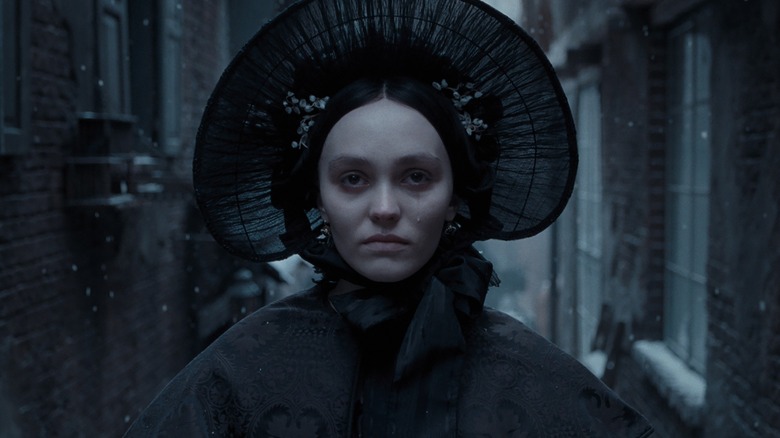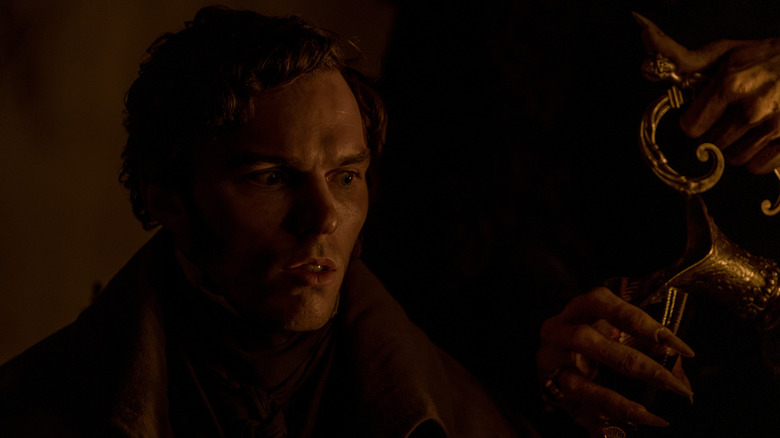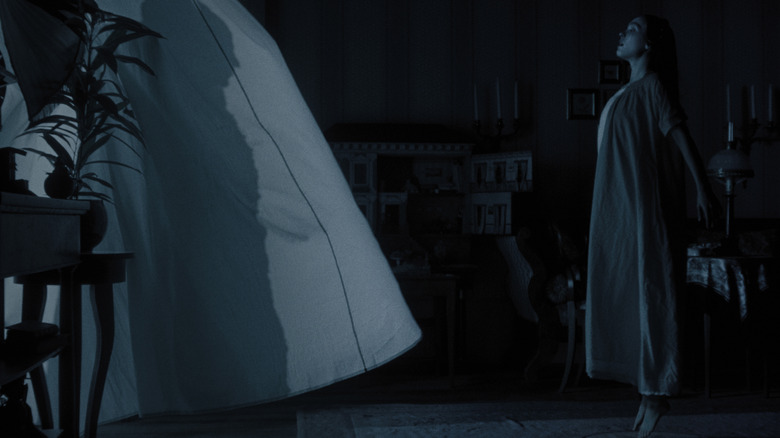Nosferatu Review: Bill Skarsgård Is Chilling In This Lovingly Crafted Nightmare
- Incredible cast
- Superb production design
- The atmosphere simply will not release you
- None!
The original silent film "Nosferatu" is more than a century old, and its shadow is so long that it still reaches across the whole of not just horror cinema, but the larger world of film. F.W. Murnau's German classic has become, much like the villain at its core, a creature of eternity.
But if anyone can harness the sheer cultural force of "Nosferatu" for the 21st century, just as Werner Herzog did for the divided Germany of the 1970s, it's Robert Eggers, the horror auteur who's made remaking Murnau's film a passion project. Over the last decade, Eggers has cemented himself as one of modern horror's most compelling artists because of his meticulous nature, his knack for atmosphere, and his impeccable taste in production design, but even by his standards this film felt different — like a chance for Eggers to level up the sheer emotional force of his filmmaking.
And, despite the long shadows of both Murnau and Herzog, he pulled it off. Eggers' "Nosferatu" is a beautifully crafted, endlessly compelling nightmare that will envelop you in its shifting, writhing darkness and simply refuse to let go. It's one of the best horror films of the year, and represents a new level of ambition and craft from one of our best horror filmmakers.
Robert Eggers has a fresh take on Nosferatu
Like F.W. Murnau's original film, Robert Eggers' "Nosferatu" centers on the newlywed Hutters who live in Germany and are embarking on what they hope will be a life of love and happiness. For husband Thomas (Nicholas Hoult), that means securing his future at the local firm where he serves as a real estate solicitor, and where his boss Herr Knock (Simon McBurney) showers him with praise and promises of advancement. At home, Thomas' wife Ellen (Lily-Rose Depp) is happy just to be with her new husband, particularly because his affection seems to keep at bay the terrifying visions and dreams that have plagued her for years — dreams that center on a mysterious, shadowy figure that calls to her in the night.
The path to the better future Thomas so desires goes through an errand he must run for his boss: a trip to Transylvania to complete contracts on a real estate purchase for the aged Count Orlok (Bill Skarsgård), an "eccentric" nobleman who wishes to retire to Germany. One hard journey later, and against his wife's wishes, Thomas comes face-to-face with this strange figure, and his family is soon plunged into a nightmare that threatens to consume not just Thomas and Ellen, but their entire world.
The basic scaffolding of the original film's narrative, itself an unauthorized adaptation of Bram Stoker's "Dracula," is retained here, but what sets Eggers' version apart is, naturally, where his focus shifts away from the version of events we know. Though Thomas would appear at first glance to be the primary plot engine, Eggers is actually much more interested in Ellen's journey, and her relationship with Orlok that eventually blossoms into a dark obsession that consumes everything around them. How exactly Eggers accomplishes this, through a carefully orchestrated feat of scripting, is best left for viewers to find out for themselves, but it's clear from the beginning that he's not interested in the simple relationship between an immortal predator and their helpless prey. Instead, he's interested in the relationship we all have with the darkness surrounding our lives, where it comes from, how we nurture it in ways both conscious and unconscious, and how it's eventually given form. It adds remarkable depth to the film, and it's all accented by an astonishing assault on the senses.
The cast is captivating
A key tonal note of "Nosferatu," one established in a line from Professor Albin Eberhart Von Franz (Willem Dafoe) in the film in its trailers, is the notion that is not simply a story about evil, but a story about a creature that wishes to consume everything in its path. Count Orlok is not simply out to corrupt and frighten, but to dominate; not just an undead creature but a vast and inescapable maw meant to devour. That means that from the beginning, Robert Eggers' film has to create a sense of its characters and its world being swallowed by the title creature's darkness.
To achieve this, Eggers and cinematographer Jarin Blaschke turn the world of the film into a series of living paintings from the Romantic era — astonishing tableaus of light and shadow in which the world never truly seems bright. The light sources are either the diffuse, pale glow of snowscapes shrouded in clouds, or the warm but precarious flicker of candle flames punctuating the inky blackness of a world still full of dark places humans can't quite comprehend. Whether it's night or day, the darkness always seems to be clawing back territory from the light in this movie, and that darkness is not static, but filled with movement.
Bill Skarsgård's Orlok is a masterpiece of sound design, prosthetic makeup, and performance. His look, deliberately hidden from viewers in marketing materials, is at once surprising and reverential, presenting a living corpse whose only true life comes from his inescapable hunger and the actor's piercing, bright eyes. He speaks in fragments, punctuated by deep, wheezing intakes of breath, and Skarsgård's ability to pitch his voice down until it sounds like it's extending out from the depths of hell will send chills through you that linger for days. Even beyond his physical presence, Orlok's ability to manipulate and live in shadows themselves becomes a key feature of the film, a chance for Eggers to create a monster so inescapable that you can never exist in any room without a chance that he's there, waiting.
But even Skarsgård's sheer force of presence is outshone by Lily-Rose Depp, who delivers the best performance of her career as Ellen, a character who knows more than anyone is willing to believe, and whose own inner darkness is deeper than even Orlok's. She plays this haunted young woman as a coiled, constantly trembling spring who erupts into moments of epileptic fury and pure, heartbreaking anguish. The world of Eggers' film, dominated by learned men of authority who think they know what's best for Ellen, sets her up as the only hope of a blighted community even as she suffers more than anyone, and Depp carries that weight with astonishing maturity and grace. The cast around her, led by Nicholas Hoult and a ferocious Dafoe, all add to the aura, building a tale of "Beauty and the Beast" that's deeper, darker, and more primal than even longtime Eggers fans might expect.
Everything in "Nosferatu," from the sound to the sights to the humans walking in its shadows, is designed to deliver an all-encompassing atmosphere of unfiltered, animal dread. It achieves that, but there's something else to the film too: lights in the dark that seduce you, compel you, dig into you like hooks. It's a film that will repulse even as you can't look away, a film that will cast a spell even as you recoil. It's a masterwork of modern horror, and a can't-miss theatrical experience from one of the best directors working right now.
"Nosferatu" creeps into theaters on December 25.


